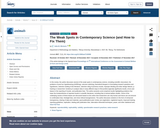
In this review, the author discusses several of the weak spots in contemporary science, including scientific misconduct, the problems of post hoc hypothesizing (HARKing), outcome switching, theoretical bloopers in formulating research questions and hypotheses, selective reading of the literature, selective citing of previous results, improper blinding and other design failures, p-hacking or researchers’ tendency to analyze data in many different ways to find positive (typically significant) results, errors and biases in the reporting of results, and publication bias. The author presents some empirical results highlighting problems that lower the trustworthiness of reported results in scientific literatures, including that of animal welfare studies. Some of the underlying causes of these biases are discussed based on the notion that researchers are only human and hence are not immune to confirmation bias, hindsight bias, and minor ethical transgressions. The author discusses solutions in the form of enhanced transparency, sharing of data and materials, (post-publication) peer review, pre-registration, registered reports, improved training, reporting guidelines, replication, dealing with publication bias, alternative inferential techniques, power, and other statistical tools.
- Subject:
- Biology
- Life Science
- Material Type:
- Reading
- Provider:
- Animals
- Author:
- Jelte M. Wicherts
- Date Added:
- 08/07/2020